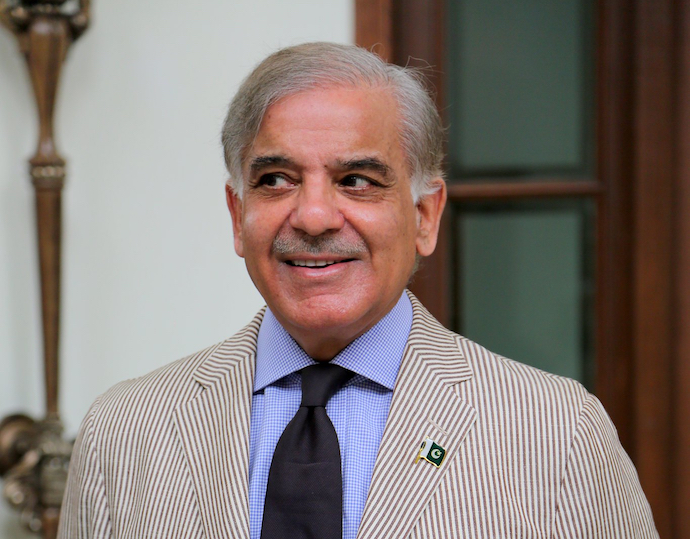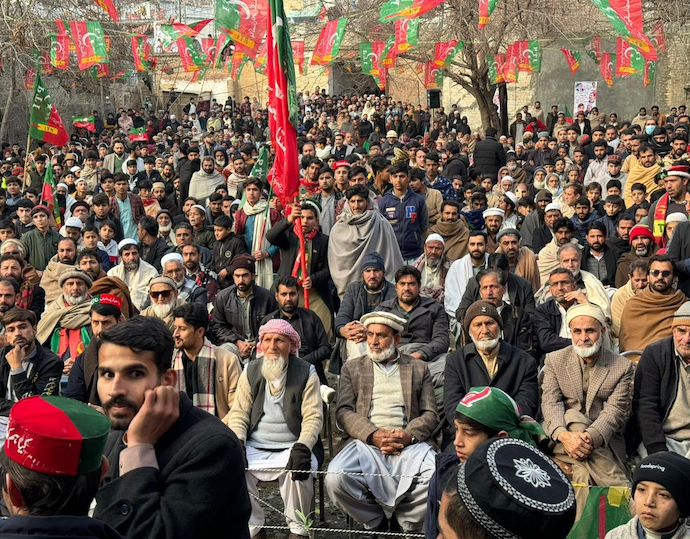The Platform
Latest Articles
by Ernani Dewi Kusumawati
by Wonderful Adegoke
by Abdul Mussawer Safi
by Mohammad Ibrahim Fheili
by James Carlini
by Mohammad Ibrahim Fheili
by Abidemi Alade
by Sheiknor Qassim
by Theo Casablanca
by Ernani Dewi Kusumawati
by Wonderful Adegoke
by Abdul Mussawer Safi
by Mohammad Ibrahim Fheili
by James Carlini
by Mohammad Ibrahim Fheili
by Abidemi Alade
by Sheiknor Qassim
by Theo Casablanca
A Tumultuous Election Day in Pakistan: The 2024 General Election Turmoil
Pakistan held yet another general election with accusations of rigging and irregularities.
On February 8, Pakistan’s 12th general elections, marred by allegations of military intervention, yielded a fragmented parliament, fueling nationwide unrest. The Pakistan Tehreek-e-Insaf (PTI) party, led by Gohar Ali Khan, promptly contested the results, claiming substantial vote manipulation and asserting evidence of their rightful win in at least 180 of the 266 contested seats. Across the nation, a chorus of protest rose from PTI and other political factions, all united in the conviction that their electoral victories had been usurped.
Meanwhile, the interim government steadfastly dismissed international entreaties to probe the rigging accusations, framing the electoral process as a matter of national sovereignty.
Election day itself was marked by a notable disruption to cellular and Internet services, a move that only amplified concerns and criticism about the integrity of the vote. Despite being incarcerated, Imran Khan declared victory, a move that galvanized his supporters into demonstrations and legal challenges. Accusations of large-scale electoral fraud permeated the discourse.
Conjectures abound that Pakistan’s formidable military apparatus orchestrated the electoral upset to Khan’s detriment. Disparities between official vote counts and those aggregated from individual polling stations have added fuel to these speculations. Both the United States and the European Union voiced their concerns, urging a thorough investigation into the alleged electoral malfeasance. Pakistan’s acting prime minister staunchly defended the electoral process, insisting on its fairness and legitimacy.

Independent candidates with PTI endorsements initially showed promising leads, but the final tallies significantly undercut the party’s performance, intensifying allegations of deliberate manipulation by the military. The official vote totals starkly contrasted with the summative figures from polling stations, prompting international calls for inquiry into the electoral proceedings.
As the country grapples with the aftermath of the elections, the political atmosphere is charged with tension. The Pakistan Tehreek-e-Insaf has been mobilizing nationwide protests over what it claims to be egregious election rigging. This unrest has steered the country toward a state of political limbo, shaking the confidence of investors and triggering a decline in the value of Pakistan’s sovereign dollar bonds. The 2024 bond notably dipped to 95.89 cents, underscoring fears that political turmoil might aggravate the nation’s economic woes.
Amidst this upheaval, international concern over the integrity of Pakistan’s elections has been mounting. The European Union has now echoed the apprehensions previously voiced by the United States and the United Kingdom, casting doubt on the election’s transparency. The call for scrutiny intensified when U.S. Department of State spokesperson Matthew Miller advocated for a thorough investigation into the rigging claims.
In a pivotal turn of events, the Pakistan Muslim League (PMLN) and the Pakistan Peoples Party (PPP) forged a coalition in response to the hung parliament resulting in Shehbaz Sharif being elected prime minister after securing a majority vote from lawmakers in the National Assembly. Shehbaz secured 201 votes while Omar Ayub Khan secured 92.
Amid accusations of electoral fraud, Gohar Ali Khan called for nationwide peaceful protests, urging parties across the political landscape, including Jamiat Ulema-e-Islam, Jamaat-e-Islami, and Grand Democratic Alliance, to join the outcry. The protests stem from a deep-seated belief among PTI ranks, that the elections lack any semblance of credibility, and their mandate has been purloined.
In a dramatic twist, Imran Khan has sought assistance from the United States, a nation he previously accused of orchestrating his removal from office. Since the no-confidence motion in April 2021, Khan has consistently pointed to a U.S.-led international conspiracy, implicating Pakistan’s military and political adversaries.
However, by November 2021, Khan indicated a willingness to reconcile with the United States. Concurrently, Khan has criticized the U.S. for its silence on the anti-PTI measures and for historically favoring authoritarian regimes. He has called on the U.S. to amend its historical stance and to actively monitor the allegations of electoral malpractice in Pakistan.

In a surprising turn of events, Hafiz Naeem ur Rehman of the Jamaat-e-Islami emerged victorious for the Karachi provincial assembly seat PS-129. Yet, controversy ensued when he claimed that the PTI-backed independent candidate had secured a greater number of votes than reported, alleging a reduction in their vote count. The authorities have rejected these claims, leaving the fate of the PS-129 seat in limbo. This case is emblematic of the broader electoral crisis in Pakistan, which has been overshadowed by accusations of widespread vote manipulation, particularly disadvantaging candidates linked to Khan.
Following the vote, Zahid Hussain, in an analysis for Dawn, posited that despite contestations of irregularities, PTI-supported ‘independents’ have notably surfaced as a dominant force in the forthcoming National Assembly. Yet, given the PTI’s non-recognition as a parliamentary party, it remains ineligible for approximately 70 seats reserved for women and religious minorities, precluding it from attaining even a simple majority needed to helm the central government. Hussain foresees a challenging road ahead for this bloc to preserve its coherence amid alleged coercion by security agencies and the specter of political horse-trading. He describes the ensuing political maneuvers as a blatant dismissal of democratic principles, dominated by self-serving interests in pursuit of power.
“Despite the alleged irregularities, the PTI-backed ‘independents’ have emerged as the single largest particular group in the next National Assembly. However, since the PTI is not recognized as a parliamentary party, it cannot get its share of some 70 reserved seats for women and religious minorities. Hence, the party cannot achieve even a simple majority to form a government at the center. Moreover, it would be extremely tough for the group to maintain its unity in the face of intimidation by the security agencies and horse-trading. Meanwhile, a new power play has begun, disregarding all democratic norms. Wheeling and dealing are the name of the game. It is all about power and control that has brought together vested interests,” Hussain writes.
Omar Waraich, weighing in for Foreign Policy, recounted how, despite disruptions to communications on election day and claims of vote theft, Khan’s advocates not only secured a substantial voter turnout but also clinched an impressive seat count. Waraich attributes Khan’s appeal to his unique blend of personal charisma, devoutness, philanthropy, and stardom – an amalgam that has resonated with his supporters since his cricketing zenith in 1992, evoking a potent yearning for national rejuvenation. Khan’s allure, according to Waraich, lies not in the veracity of his promises but in the fervor with which they are pledged.
Michael Kugelman, in his critique “How Imran Khan’s Party Stunned Pakistan,” observed that while the PTI may not clinch governance, it has harnessed widespread disenchantment to deliver a potent challenge to the entrenched powers.
On February 19, a new coalition emerged, with independents who succeeded in the elections under Khan’s aegis aligning with the minority Sunni Ittehad Council to attempt government formation.
Today’s political landscape in Pakistan is fraught with tension over allegations of election rigging. A New York Times piece, “An Election Shatters the Image of Pakistan’s Mightiest Force,” posits that the military’s longstanding image as the architect behind Pakistan’s political scene has been profoundly challenged.
Following the announcement by the Pakistan Muslim League and the Pakistan Peoples Party, the PTI has forecasted severe political instability should the populace be coerced into accepting what it terms the “slavery of criminals.” The PTI has firmly dismissed the nascent alliance and vowed to contest the ‘theft’ of its mandate on all fronts.
The Pakistan Muslim League and the Muttahida Qaumi Movement have agreed to work together within the government framework. This accord emphasizes their mutual aim to achieve reconciliation and to bolster political, democratic, and economic stability nationwide. At the heart of their negotiations lies the principle of fair resource allocation and empowerment, setting the stage for future dialogues on pressing issues, including urban rights in Sindh, especially Karachi, and revitalizing the city’s economic vitality.
This new coalition bears a striking resemblance to the fragile coalition that was formed to remove Khan from office, marking Sharif’s initial ascent to the premiership. The PTI’s indignation toward the coalition and the repeated allegations of electoral misconduct are not without merit. The rigging issue is grave, threatening to fracture the nation, and demands immediate and rigorous examination.
Amid these allegations, Pakistan has plunged once again into a political quandary, concurrently grappling with dire economic and security challenges. The incipient Sharif administration must confront these issues head-on to fend off political disarray and potential anarchy. Yet, there is a sense of historical repetition, a déjà vu of past failed democratic attempts shaped by military influence. As the nation veers towards an increasingly authoritarian governance model, the prospects for democratic evolution in Pakistan seem bleak.
Sohail Mahmood is an independent political analyst focused on global politics, U.S. foreign policy, governance, and the politics of South and West Asia.